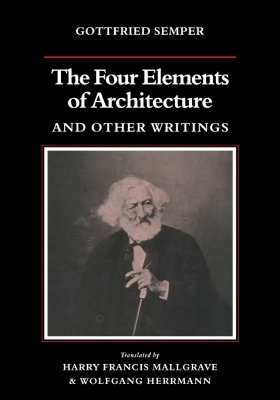Res Monographs in Anthropology and Aesthetics
1 total work
Gottfied Semper was the most important German theorist of the nineteenth century. From his first published essay on Greek polychromy in 1834 to his final lecture on the origin of architectural styles in 1869, Semper persistently endeavoured to fashion a comprehensive architectural theory explaining the meaning and transformational nature of architectural form. The breadth and richness of his ideas, both applauded and opposed at the turn of the twentieth century, proved enormously influential in the development of modern theory. Originally published in 1989, this book provides an English translation of a number of Semper's published writings. The introduction seeks to trace the course of Semper's theoretical development over thirty-five years. Semper's ideas, like those of his contemporaries, John Ruskin and Eugene Viollet-le-Duc, had enormous influence on the genesis of modern architectural theory and will appeal to both architectural historians and architects.
